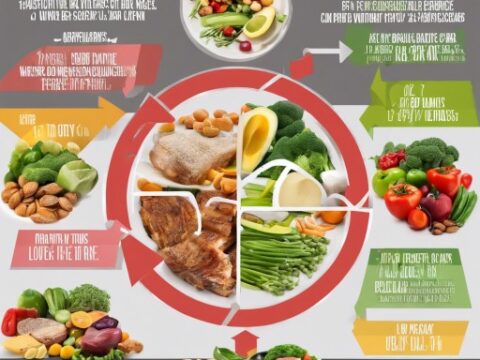
Low Carb Diet Myths Debunked: Separating Fact from Fiction
In today’s health-conscious world, diet trends come and go, and its easy to get overwhelmed by the plethora of information available. One such trend that has gained massive popularity in recent years is the low carb diet. However, as with any diet plan, there are numerous myths and misconceptions surrounding low carb diets. Lets delve into the truth behind these myths and separate fact from fiction.
Myth #1: Low Carb Diets are All About Eliminating Carbohydrates Completely
Fact: While it’s true that low carb diets focus on reducing carbohydrate intake, they do not advocate for eliminating them altogether. The goal of a low carb diet is to limit the intake of foods that are high in refined carbs, such as white bread, sugary snacks, and processed foods. Instead, low carb diets encourage the consumption of nutrient-dense carbohydrates found in vegetables, legumes, and whole grains.
Myth #2: Low Carb Diets are Unhealthy and Deprive the Body of Essential Nutrients
Fact: On the contrary, when done correctly, low carb diets can provide all the essential nutrients the body needs. While it’s true that cutting back on certain food groups may result in reduced intake of some nutrients, a well-planned low carb diet can easily compensate for this. By including a variety of protein sources, healthy fats, and non-starchy vegetables, low carb diets can offer a well-balanced and nutrient-rich meal plan.
Myth #3: Low Carb Diets Lead to Nutritional Deficiencies
Fact: If followed properly, low carb diets can actually improve overall nutrition status. By focusing on wholesome, unprocessed foods, low carb diets typically increase the intake of important nutrients such as fiber, vitamins, and minerals. However, it’s crucial to approach the diet in a well-rounded manner, ensuring adequate intake of all essential nutrients. Consulting with a registered dietitian can help design a low carb diet plan that meets individual nutritional needs.
Myth #4: Low Carb Diets are Difficult to Maintain
Fact: Like any lifestyle change, adapting to a low carb diet may pose initial challenges. However, there are numerous delicious and satisfying low carb meals and snacks available. With a little creativity, one can enjoy a variety of satisfying options like lean proteins, healthy fats, and a range of colorful vegetables. Additionally, many resources, such as low carb cookbooks and online communities, provide support and inspiration to those embarking on a low carb journey.
Myth #5: Low Carb Diets Cause Muscle Loss
Fact: When following a low carb diet, the body naturally turns to fat stores for energy instead of relying on carbohydrates. This is known as ketosis. Some people mistakenly believe that this leads to muscle loss. However, when the diet includes sufficient protein, muscle mass can be preserved while the body predominantly burns fat for fuel. Incorporating lean protein sources like poultry, fish, tofu, and legumes into the low carb diet can help maintain muscle mass.
Myth #6: Low Carb Diets are Not Sustainable Long-Term
Fact: The sustainability of any diet depends on individual preferences and commitment. While low carb diets may not be suitable for everyone, many individuals have successfully followed this dietary approach for years. With numerous recipe variations, meal planning options, and an ever-expanding range of low carb products available in stores, sticking to a low carb diet can be just as sustainable as any other long-term dietary change, provided it is done mindfully and with appropriate nutrition.
Myth #7: Low Carb Diets are All About Weight Loss
Fact: Although low carb diets have been associated with successful weight loss in many individuals, they offer several other potential benefits. Some people find that a low carb diet helps regulate blood sugar levels, reduces cravings, and provides a steady supply of sustained energy throughout the day. Additionally, low carb diets have shown promise in improving risk factors associated with conditions such as diabetes, metabolic syndrome, and cardiovascular diseases.
In conclusion, debunking the myths surrounding low carb diets is essential to gain a clear understanding of their potential benefits and their suitability for individual needs. Low carb diets, when balanced and well-planned, can provide a sustainable and nutritious approach to both weight management and overall health. As with any dietary change, it is crucial to consult with a healthcare professional before adopting a low carb diet, especially if you have any pre-existing conditions or concerns.




